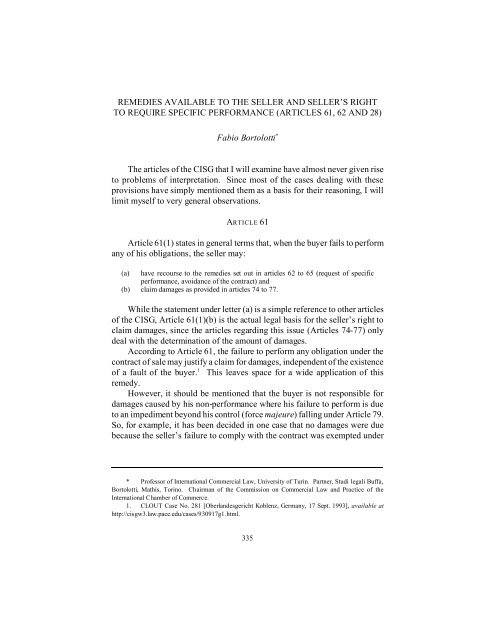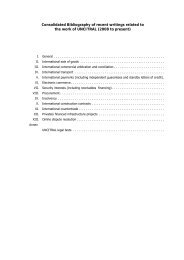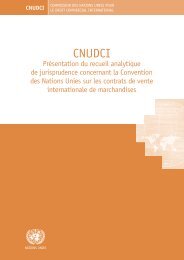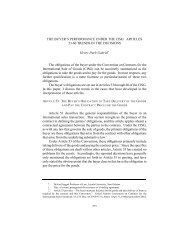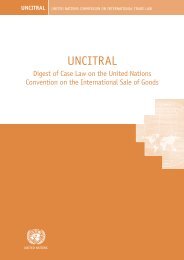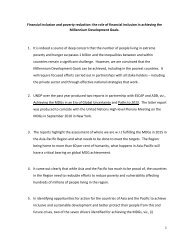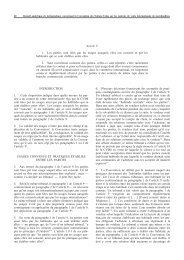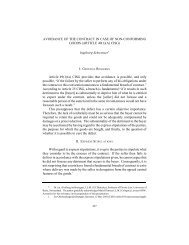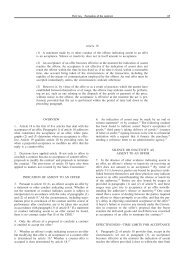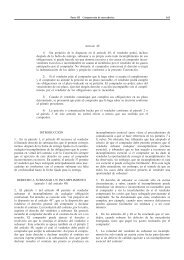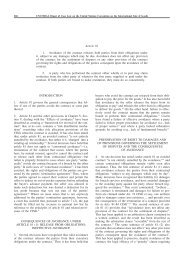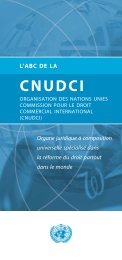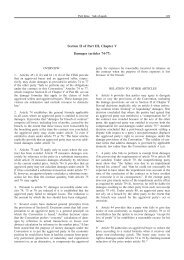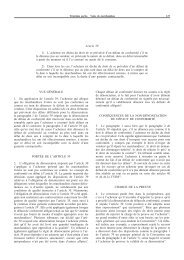remedies available to the seller and seller's - UNCITRAL
remedies available to the seller and seller's - UNCITRAL
remedies available to the seller and seller's - UNCITRAL
Create successful ePaper yourself
Turn your PDF publications into a flip-book with our unique Google optimized e-Paper software.
REMEDIES AVAILABLE TO THE SELLER AND SELLER’S RIGHT<br />
TO REQUIRE SPECIFIC PERFORMANCE (ARTICLES 61, 62 AND 28)<br />
Fabio Bor<strong>to</strong>lotti *<br />
The articles of <strong>the</strong> CISG that I will examine have almost never given rise<br />
<strong>to</strong> problems of interpretation. Since most of <strong>the</strong> cases dealing with <strong>the</strong>se<br />
provisions have simply mentioned <strong>the</strong>m as a basis for <strong>the</strong>ir reasoning, I will<br />
limit myself <strong>to</strong> very general observations.<br />
ARTICLE 61<br />
Article 61(1) states in general terms that, when <strong>the</strong> buyer fails <strong>to</strong> perform<br />
any of his obligations, <strong>the</strong> <strong>seller</strong> may:<br />
(a) have recourse <strong>to</strong> <strong>the</strong> <strong>remedies</strong> set out in articles 62 <strong>to</strong> 65 (request of specific<br />
performance, avoidance of <strong>the</strong> contract) <strong>and</strong><br />
(b) claim damages as provided in articles 74 <strong>to</strong> 77.<br />
While <strong>the</strong> statement under letter (a) is a simple reference <strong>to</strong> o<strong>the</strong>r articles<br />
of <strong>the</strong> CISG, Article 61(1)(b) is <strong>the</strong> actual legal basis for <strong>the</strong> <strong>seller</strong>’s right <strong>to</strong><br />
claim damages, since <strong>the</strong> articles regarding this issue (Articles 74-77) only<br />
deal with <strong>the</strong> determination of <strong>the</strong> amount of damages.<br />
According <strong>to</strong> Article 61, <strong>the</strong> failure <strong>to</strong> perform any obligation under <strong>the</strong><br />
contract of sale may justify a claim for damages, independent of <strong>the</strong> existence<br />
of a fault of <strong>the</strong> buyer. 1 This leaves space for a wide application of this<br />
remedy.<br />
However, it should be mentioned that <strong>the</strong> buyer is not responsible for<br />
damages caused by his non-performance where his failure <strong>to</strong> perform is due<br />
<strong>to</strong> an impediment beyond his control (force majeure) falling under Article 79.<br />
So, for example, it has been decided in one case that no damages were due<br />
because <strong>the</strong> <strong>seller</strong>’s failure <strong>to</strong> comply with <strong>the</strong> contract was exempted under<br />
* Professor of International Commercial Law, University of Turin. Partner, Studi legali Buffa,<br />
Bor<strong>to</strong>lotti, Mathis, Torino. Chairman of <strong>the</strong> Commission on Commercial Law <strong>and</strong> Practice of <strong>the</strong><br />
International Chamber of Commerce.<br />
1. CLOUT Case No. 281 [Oberl<strong>and</strong>esgericht Koblenz, Germany, 17 Sept. 1993], <strong>available</strong> at<br />
http://cisgw3.law.pace.edu/cases/930917g1.html.<br />
335
336 JOURNAL OF LAW AND COMMERCE [Vol. 25:335<br />
Article 79. 2 In ano<strong>the</strong>r case, where <strong>the</strong> purchaser terminated a long-term sales<br />
agreement because of a price decrease requested by his cus<strong>to</strong>mer, <strong>the</strong> court<br />
decided that this termination did not amount <strong>to</strong> a situation falling under<br />
Article 79 <strong>and</strong>, consequently, awarded <strong>the</strong> <strong>seller</strong> damages arising from <strong>the</strong><br />
buyer’s unjustified contract avoidance. 3<br />
One of <strong>the</strong> most common situations justifying a claim for damages arises<br />
when <strong>the</strong> buyer does not take delivery of <strong>the</strong> goods (or declares his<br />
unwillingness <strong>to</strong> do so) <strong>and</strong> <strong>the</strong> <strong>seller</strong> consequently avoids <strong>the</strong> contract <strong>and</strong><br />
sells <strong>the</strong> goods <strong>to</strong> ano<strong>the</strong>r purchaser. 4 In this case, <strong>the</strong> <strong>seller</strong> will claim, <strong>the</strong><br />
damage suffered, 5 which will normally be <strong>the</strong> difference between <strong>the</strong> price<br />
actually paid by <strong>the</strong> third party <strong>and</strong> <strong>the</strong> price that <strong>the</strong> buyer should have paid 6<br />
plus o<strong>the</strong>r possible expenses, 7 instead of <strong>the</strong> price of <strong>the</strong> goods.<br />
A similar situation arises where <strong>the</strong> buyer does not timely issue a<br />
documentary credit, where this type of payment was agreed between <strong>the</strong><br />
parties. 8<br />
However, <strong>the</strong> claim for damages may also concur with <strong>the</strong> claim for<br />
payment of <strong>the</strong> price. For example, a German court has condemned <strong>the</strong> buyer<br />
not only <strong>to</strong> pay <strong>the</strong> price of <strong>the</strong> goods (under Article 62), but also <strong>to</strong> reimburse<br />
<strong>the</strong> <strong>seller</strong> for <strong>the</strong> costs sustained in respect of dishonoured checks provided by<br />
<strong>the</strong> buyer. 9<br />
While <strong>the</strong> <strong>seller</strong>’s right <strong>to</strong> require interest on delayed payment need not<br />
be construed as a claim for damage, since such right is expressly recognized<br />
2. Amtsgericht Willisau, Switzerl<strong>and</strong>, 12 Mar. 2004, <strong>available</strong> at http://cisgw3.law.pace.edu/cases/<br />
040312s1.html (CISG-online No. 961).<br />
3. CLOUT Case No. 480 [Cour d’Appel Colmar, France, 12 June 2001], <strong>available</strong> at http://<br />
cisgw3.law.pace.edu/cases/010612f1.html.<br />
4. CLOUT Case No. 47 [L<strong>and</strong>gericht Aachen, Germany, 14 May 1993], <strong>available</strong> at http://<br />
cisgw3.law.pace.edu/cases/930514g1.html.<br />
5. There are many cases applying this principle. See, e.g., L<strong>and</strong>gericht Göttingen, Germany,<br />
20 Sept. 2002, <strong>available</strong> at http://cisgw3.law.pace.edu/cases/020920g1.html; H<strong>and</strong>elsgericht St. Gallen,<br />
Switzerl<strong>and</strong>, 3 Dec. 2002, <strong>available</strong> at http://cisgw3.law.pace.edu/cases/021203s1.html.<br />
6. See, e.g., Kan<strong>to</strong>nsgericht Zug, Switzerl<strong>and</strong>, 12 Dec. 2002, <strong>available</strong> at http://<br />
cisgw3.law.pace.edu/cases/021212sl.html; Oberl<strong>and</strong>esgericht Graz, Austria, 24 Jan. 2002, <strong>available</strong> at<br />
http://cisgw3.law.pace.edu/cases/020124a3.html (CISG-Online No. 801).<br />
7. Such as, for example, <strong>the</strong> chartering of a vessel for shipping <strong>the</strong> goods <strong>to</strong> <strong>the</strong> buyer. See<br />
Supreme Court of Queensl<strong>and</strong>, Australia, 12 Oct. 2001, <strong>available</strong> at http://cisgw3.law.pace.edu/<br />
cases/011012a2.html (regarding a contract for scrap steel).<br />
8. Id.; CLOUT Case No. 261 [Bezirksgericht der Saane, Switzerl<strong>and</strong>, 20 Feb. 1997], <strong>available</strong> at<br />
http://cisgw3.law.pace.edu/cases/970220sl.html; Cour de Justice Genève, Switzerl<strong>and</strong>, 13 Sept. 2002,<br />
<strong>available</strong> at http://cisgw3.law.pace.edu/cases/020913sl.html.<br />
9. CLOUT Case No. 376 [L<strong>and</strong>gericht Bielefeld, Germany, 2 Aug. 1996], <strong>available</strong> at<br />
http://cisgw3.law.pace.edu/cases/960802g1.html.
2005-06] ARTICLES 61, 62 AND 28 337<br />
in Article 78, <strong>the</strong>re may be space for claiming as damage, in addition <strong>to</strong><br />
interest, <strong>the</strong> cost for a credit. 10<br />
An interesting application of Article 61(1)(b) regards <strong>the</strong> <strong>seller</strong>’s right <strong>to</strong><br />
claim <strong>the</strong> reimbursement of at<strong>to</strong>rneys’ fees paid for recovering his credit.<br />
Several courts have decided that when <strong>the</strong> buyer delays payment, <strong>and</strong> thus<br />
forces <strong>the</strong> <strong>seller</strong> <strong>to</strong> have recourse <strong>to</strong> an at<strong>to</strong>rney, he causes a damage for which<br />
<strong>the</strong> <strong>seller</strong> should be indemnified. 11<br />
As regards Article 61(3), according <strong>to</strong> which <strong>the</strong> courts or arbitral<br />
tribunals cannot grant a period of grace when <strong>the</strong> <strong>seller</strong> resorts <strong>to</strong> a remedy for<br />
breach of contract, this provision has rarely given rise <strong>to</strong> discussion. In a<br />
recent case, a Belgian Court has stated <strong>the</strong> principle that a court cannot grant<br />
such period of grace due <strong>to</strong> Article 61. 12<br />
ARTICLE 62 AND ARTICLE 28<br />
Article 62 expressly recognizes <strong>the</strong> <strong>seller</strong>’s right <strong>to</strong> require <strong>the</strong> buyer <strong>to</strong><br />
pay <strong>the</strong> price, take delivery or perform o<strong>the</strong>r obligations, unless <strong>the</strong> <strong>seller</strong> has<br />
resorted <strong>to</strong> a remedy which is inconsistent with this requirement.<br />
Thus, this provision gives <strong>the</strong> <strong>seller</strong> <strong>the</strong> right <strong>to</strong> require specific<br />
performance of <strong>the</strong> buyer’s obligations, which solution, however, can be<br />
applied only within <strong>the</strong> limits of Article 28. This means that courts which<br />
would not enter in<strong>to</strong> a judgement for specific performance under <strong>the</strong>ir national<br />
law, may refuse such request. This should not create problems in <strong>the</strong> most<br />
common case, i.e. where <strong>the</strong> <strong>seller</strong>, having delivered <strong>the</strong> goods, claims<br />
payment from <strong>the</strong> buyer. 13 So, it is normal that, in such a case, <strong>the</strong> court<br />
makes express reference <strong>to</strong> Article 62 affirming that, since <strong>the</strong> <strong>seller</strong> did not<br />
comply with his payment obligation, he must pay <strong>the</strong> price (or <strong>the</strong> remaining<br />
part of it in case of partial payment). 14<br />
10. CLOUT Case No. 281 [Oberl<strong>and</strong>esgericht Koblenz, Germany, 17 Sept. 1993], <strong>available</strong> at<br />
http://cisgw3.law.pace.edu/cases/930917g1.html.<br />
11. L<strong>and</strong>gericht Berlin, Germany, 21 Mar. 2003, <strong>available</strong> at http://cisgw3.law.pace.edu/<br />
cases/030321g1.html; CLOUT Case No. 166 [Schiedsgericht der H<strong>and</strong>elskammer Hamburg, Germany,<br />
21 June 1996], <strong>available</strong> at http://cisgw3.law.pace.edu/cases/960621g1.html; Oberl<strong>and</strong>esgericht<br />
Düsseldorf, Germany, 22 July 2004 (CISG-Online No. 916).<br />
12. Rechtbank van Kooph<strong>and</strong>el Hasselt, Belgium, 18 Feb. 2004, <strong>available</strong> at http://<br />
www.law.kuleuven.ac.be/ipr/eng/cases/2004-02-18.html (Dutch).<br />
13. Even in countries which tend <strong>to</strong> limit <strong>the</strong> possibility of <strong>the</strong> courts <strong>to</strong> grant specific performance<br />
(mainly <strong>the</strong> common law countries), <strong>the</strong> <strong>seller</strong> will normally have <strong>the</strong> right <strong>to</strong> recover <strong>the</strong> price of goods<br />
delivered. See, for example, § 2-709 of <strong>the</strong> U.S. Uniform Commercial Code.<br />
14. I will mention only some of <strong>the</strong> most recent cases. L<strong>and</strong>gericht Bielefeld, Germany, 15 Aug.<br />
2003, <strong>available</strong> at http://cisgw3.law.pace.edu/cases/030815g1.html (CISG-online No. 906); Cour de Justice
338 JOURNAL OF LAW AND COMMERCE [Vol. 25:335<br />
In some cases, <strong>the</strong> <strong>seller</strong> may claim payment of <strong>the</strong> price even where <strong>the</strong><br />
goods have not been delivered. So, in a case where <strong>the</strong> buyer clearly refused<br />
<strong>to</strong> take delivery of <strong>the</strong> goods, <strong>the</strong> <strong>seller</strong> has insisted in obtaining payment for<br />
<strong>the</strong> goods that were ready for shipment at its premises, <strong>and</strong> <strong>the</strong> court has<br />
accepted such a claim. 15<br />
As regards <strong>the</strong> right of <strong>the</strong> <strong>seller</strong> <strong>to</strong> require <strong>the</strong> buyer <strong>to</strong> take delivery of<br />
<strong>the</strong> goods, it is very unlikely that <strong>the</strong> <strong>seller</strong> will resort <strong>to</strong> this remedy. In fact,<br />
unless <strong>the</strong> <strong>seller</strong> has already received payment, he will prefer <strong>to</strong> avoid <strong>the</strong><br />
contract (<strong>and</strong> retain <strong>the</strong> goods) <strong>and</strong> make a claim for damages, instead of<br />
requesting payment of <strong>the</strong> price. And, where payment is warranted through<br />
a documentary credit, <strong>the</strong> <strong>seller</strong> will be able <strong>to</strong> ship <strong>the</strong> goods (<strong>and</strong> <strong>to</strong> obtain<br />
payment from <strong>the</strong> bank) without needing <strong>to</strong> force <strong>the</strong> buyer <strong>to</strong> take delivery.<br />
de Genève, Switzerl<strong>and</strong>, 19 Sept. 2003 (CISG-online No. 854); L<strong>and</strong>gericht München, Germany, 27 Feb.<br />
2002, <strong>available</strong> at http://cisgw3.law.pace.edu/cases/020227g1.html.<br />
15. L<strong>and</strong>gericht Hamburg, Germany, 10 Sept. 1993 (CISG Online No. 874).


